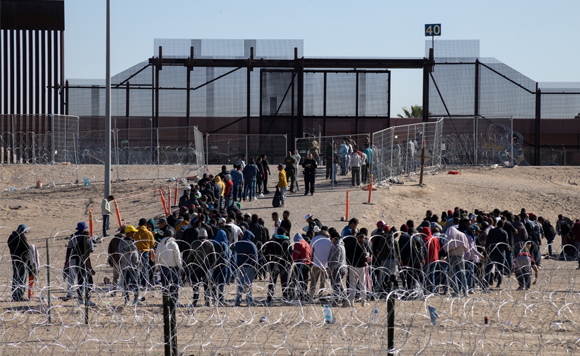
Mexico Develops Massive Tent Shelters in Advance of Mass Deportations From The United States
Large tent shelters are being built in Mexico in anticipation of a possible deportation wave brought on by President Trump’s immigration policy.
Mexican officials have started building sizable tent shelters in Ciudad Juarez to house thousands of deported Mexicans in reaction to US President Donald Trump’s pledged mass deportations.
This preventative action is a component of a larger government plan to handle the logistical and humanitarian issues that could arise from the expulsion of millions of people without documentation.
Enrique Licon, a municipal official in charge of the Ciudad Juarez activities, called the endeavor “unprecedented.” The shelters are just across the Rio Grande from El Paso, Texas, and workers are rushing to get them up in time. The temporary shelters will be ready to serve food, temporary housing, medical care, and help with identity documentation within a few days, Licon said.
With plans to open shelters and receiving centers in nine communities around northern Mexico, the program, called “Mexico Embraces You,” goes beyond Ciudad Juarez. The administration also plans to send out a fleet of busses to return deportees to their hometowns.
Millions of undocumented immigrants may be deported under Trump’s deportation plan, which is billed as the biggest in US history. Experts estimate that such an operation would have major cost ramifications and take years to complete. El Colegio de la Frontera Norte (COLEF) conducted an investigation that found that there are currently around 5 million undocumented Mexicans living in the United States. Many of them come from areas in central and southern Mexico, such Michoacán, Guerrero, and Chiapas, where families have been forced to leave their homes due to poverty and violence.
Despite the Mexican government’s claims of preparedness, officials and immigration organizations have expressed doubts about the nation’s ability to manage the volume of deportations. There is concern that border cities in Mexico may soon be overrun, especially if the US implements more policy changes like reintroducing the Migrant Protection Protocols (MPP).
CBP One, a program that allowed migrants in Mexico to plan legal entry into the United States, was recently terminated by the Trump administration. Non-Mexican asylum seekers are now required to stay in Mexico while their US claims are being handled as a result of the reintroduction of MPP. These actions can result in a border congestion, severely taxing Mexican resources.
Former Tijuana head of migration issues Jose Luis Perez openly expressed doubts about Mexico’s readiness. He cautioned, “The government isn’t coordinated to receive them with the cancellation of CBP One and deportations.” After receiving criticism for his comments, he was fired soon after, which he interprets as retaliation.
“Mexico will do everything necessary to care for its compatriots and will allocate whatever is necessary to receive those who are repatriated,” said Rosa Icela Rodriguez, Mexico’s interior minister, reinforcing the government’s commitment to aiding deported Mexicans.
Mexico still confronts major economic challenges in spite of these guarantees.
Given the year’s predicted slow economic development, the abrupt deportation wave might cause instability in rural areas and border cities. Wayne Cornelius, an expert at the University of California, San Diego, cautioned that the loss of the remittances given by undocumented workers in the United States might cause “serious economic disruptions” in many places.
Against this uncertain backdrop, preparations are still underway in Ciudad Juarez.
Soldiers are constructing industrial kitchens to feed deportees close to a location where Pope Francis once offered prayers for migrants. The question of whether Mexico can accommodate the possibly enormous number of returns while preserving stability still looms.
The incident highlights the profound logistical and personal challenges of large deportation efforts, which affect lives on both sides of the border as tensions increase and laws change.
All Categories
Recent Posts
Tags
+13162306000
zoneyetu@yahoo.com



